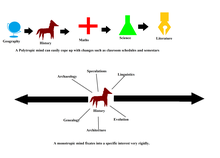
Back فرط التركيز Arabic Хиперфокус Bulgarian Hyperfokusace Czech Hyperfokus German Hiperconcentración Spanish Hyperfocus (psychologie) French מיקוד יתר HE 과집중 Korean Hiperfoco Portuguese Hiperfocus Romanian

Hyperfocus is an intense form of mental concentration or visualization that focuses consciousness on a subject, topic, or task. In some individuals, various subjects or topics may also include daydreams, concepts, fiction, the imagination, and other objects of the mind. Hyperfocus on a certain subject can cause side-tracking away from assigned or important tasks.
Psychiatrically, it is considered to be a trait of ADHD together with inattention, and it has been proposed as a trait of other conditions, such as schizophrenia, and autism spectrum disorder (ASD).[1][2]
One proposed factor in hyperfocus as a symptom involves the psychological theory of brain lateralization, wherein one hemisphere of the brain specializes in some neural functions and cognitive processes over others. Those who have a tendency to hyperfocus, such as those with ADHD, may experience a form of "pseudoneglect" where attention is dominant on one side of the brain, leading to preferential attention in some neural connections and processes over others overall.[3][4] While this idea is under study, it is not yet empirically proven.[5][6][7]
Hyperfocus may bear a relationship to the concept of flow.[2] In some circumstances, both flow and hyperfocus can be an aid to achievement, but in other circumstances, the same focus and behavior could be a liability, distracting from the task at hand. However, unlike hyperfocus, "flow" is often described in more positive terms, suggesting they are not two sides of the same condition under contrasting circumstance or intellect.[7]
- ^ Kooij, J. J. S.; Bijlenga, D.; Salerno, L.; Jaeschke, R.; Bitter, I.; Balázs, J.; Thome, J.; Dom, G.; Kasper, S. (1 February 2019). "Updated European Consensus Statement on diagnosis and treatment of adult ADHD". European Psychiatry. 56: 14–34. doi:10.1016/j.eurpsy.2018.11.001. hdl:10651/51910. ISSN 0924-9338. PMID 30453134.
- ^ a b Webb, James T.; Amend, Edward R.; Webb, Nadia E.; Goerss, Jean; Beljan, Paul; Olenchak, F. Richard (2005), Misdiagnosis and Dual Diagnoses of Gifted Children and Adults: ADHD, Bipolar, OCD, Asperger's, Depression, and Other Disorders, Scottsdale, AZ: Great Potential Press, Inc., pp. 50–51, ISBN 9780910707640,
…there are no empirical data that support hyperfocus as an aspect of ADD/ADHD. In gifted children without ADD/ADHD, this rapt and productive attention state is described by Csikszentmihalyi (1990) as 'flow.' … What has been coined 'hyperfocus' in persons with ADD/ADHD seems to be a less medical-sounding description of perseveration. Thus the apparent ability to concentrate in certain limited situations does not exclude the diagnosis of ADD/ADHD.
- ^ Zou, Hongliang; Yang, Jian (6 December 2018). "Exploring the Brain Lateralization in ADHD Based on Variability of Resting-State fMRI Signal". Journal of Attention Disorders. 25 (2): 258–264. doi:10.1177/1087054718816170. PMID 30520697 – via Sage Publications.
- ^ Helfer, Bartosz; Maltezos, Stefanos; Liddle, Elizabeth; Kuntsi, Jonna; Asherson, Philip (29 June 2020). "Lateralization of attention in adults with ADHD: Evidence of pseudoneglect". European Psychiatry: The Journal of the Association of European Psychiatrists. 63 (1): e68. doi:10.1192/j.eurpsy.2020.68. ISSN 1778-3585. PMC 7443776. PMID 32594941.
- ^ Freed, Jeffrey; Parsons, Laurie (21 October 1998). Right-Brained Children in a Left-Brained World: Unlocking the Potential of Your ADD Child. Simon and Schuster. ISBN 9780684847931.
- ^ Pfabigan, Daniela M.; Tran, Ulrich S. (21 August 2015). Behavioral and Physiological Bases of Attentional Biases: Paradigms, Participants, and Stimuli. Frontiers Media SA. ISBN 9782889196401.
- ^ a b White, Holly A.; Shah, Priti (1 April 2006). "Uninhibited imaginations: Creativity in adults with Attention-Deficit/Hyperactivity Disorder". Personality and Individual Differences. 40 (6): 1121–1131. doi:10.1016/j.paid.2005.11.007. ISSN 0191-8869.
© MMXXIII Rich X Search. We shall prevail. All rights reserved. Rich X Search